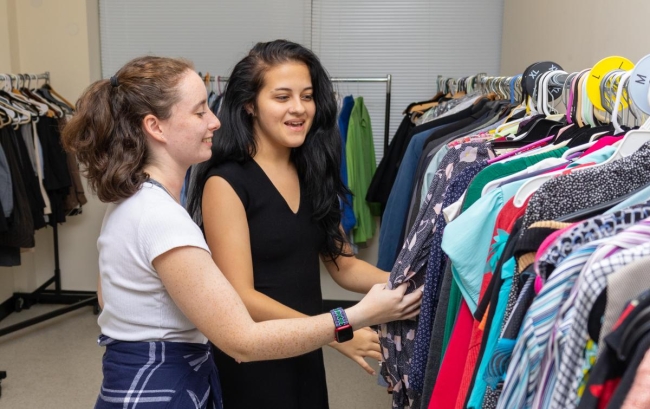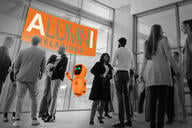You have /5 articles left.
Sign up for a free account or log in.

Hofstra University’s career closet gives students free, secondhand professional clothing to dress them for success.
Hofstra University
Ashlei Rivera recently stopped in to Hofstra University’s “career closet” to find clothes for an interview for what she hopes will be her first full-time job after graduation.
“I knew exactly what I needed: a nice little dress for this interview—that’s what I feel comfortable with,” she said. “I found this cute little blue, almost button-up dress that came down to my knees. It was a designer brand.”
Rivera, a second-year master’s student in marketing, has been using Hofstra’s career closet for more than three years. She first heard about the resource, which allows students to obtain new and gently used professional attire for free on campus, when she was a Hofstra undergraduate. Back then, there wasn’t a permanent location for the closet; rather, the Career Design and Development Center held events each semester where students could pick out donated clothes.
The service has grown so popular that the university opened a permanent location last month.
“Higher education is not cheap at all and, personally, I worked multiple jobs while I was at Hofstra and I still do,” Rivera said. “I think it’s just a wonderful, wonderful resource.”
Career closets are a somewhat new phenomenon on college campuses. Though they vary from institution to institution, all are predicated on a similar idea: that being a college student is already expensive enough without having to shell out hundreds of dollars for a professional wardrobe when it comes time to find a job.
Some colleges allow students to drop in to “shop” their closets, while others require them to make appointments. Some impose limits on how many items a student may take in a single visit; others employ a library-esque model, in which students are expected to borrow and return the clothes.
In most cases, the clothes are provided free of charge and the stock comes from donations.
Like Hofstra’s, the University of Washington’s Husky Career Closet grew during the COVID-19 pandemic from an occasional pop-up shop to a permanent fixture on campus. At both universities, officials in the career center created the closets out of rooms once utilized by recruiters to interview students—rooms that are no longer necessary now that companies are conducting more interviews online.
“Making a permanent closet space was a great use of those two rooms,” said Briana Randall, executive director of the Career and Internship Center at UW, which officially opened its career closet in February.
Clothing donors typically include parents and alumni as well as university faculty and staff. Some student and community organizations have held clothing drives to fill the career closets’ hangers.
Michelle Kyriakides, executive director of the Career Design and Development Center at Hofstra, recalls that once a parent coming from California to visit her son on the Long Island campus brought a massive bag of clothing with her.
“If you can do that, I can come meet you on campus on a Saturday” to retrieve it, she remembers thinking at the time.
Donations have picked up somewhat since the pandemic, she said. Many workers who have switched to remote work schedules have piles of professional clothes lingering in their closets and drawers, and they tend to feel more comfortable giving it to students than to a random thrift shop.
“Many folks, they don’t want to just drop their clothing in a bin,” Kyriakides said. “They want to know that it’s going to be used. We had community members who saw a story within our local newspaper and have brought in clothes saying, ‘I wore professional attire throughout my career and it’s been sitting in my closet and now I know it’s going to go to someone who will use it.’”
Belts, Blazers and Men’s Shoes
Popular articles of clothing vary slightly from institution to institution. At Virginia Commonwealth University, blazers are “the hottest item,” said Aimee Selleck, job location and development coordinator, noting that accessories like ties and belts also do very well.
At the University of Washington, certain items that students want—such as smaller sizes, business-casual blazers and men’s shoes—are rarely donated, Randall said. The closet received a grant that she used to buy a few in-demand items, but now she’s trying to figure out how to keep the closet stocked once the grant money runs out.
“We don’t really, at this point, have a sustainable way to get product that would work for our students, because we let students keep the clothes,” she said, noting that the university decided not to go with the rental model to avoid having to wash the clothes between wearings.
Despite some challenges, the career closet at Washington has been a success; in a voluntary survey Randall recently conducted of students who have used the closet since its February opening, 82 percent said the clothes increased their confidence at professional events—including interviews and networking meetings—and 73 percent said it decreased the stress of preparing for those events.
The closets also remove transportation barriers for students seeking new clothes; rather than taking the time to drive to a store, most students can simply stop in at the career closet as part of their daily routine.
“Having the access be on campus … where they can walk or take the bus or bike or whatever their access looks like, I think that’s really key,” said Selleck, who leads the career closet—known as the Suit Yourself Closet—on VCU’s Monroe Park campus.
Professional dress codes may be falling out of fashion in the era of virtual meetings, but many career officials and students alike still think it’s important for new employees to dress professionally.
For Rivera, it’s all about confidence.
“When you’re in an interview and you look nice on the top and you have pajama pants on the bottom, you’re feeling kind of halfsy about it … like I’m ready, but I’m not ready,” she said. “For me personally, I think you feel as good as you look.”





